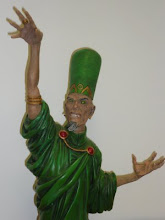 A sharp and engaging second issue that neatly solves a number of difficult problems. When the warden at St Jude's Home for the Wayward decides to demonstrate her satanic capabilities by summoning a demon she finds out that summoning a demon is by no means the same as commanding a demon. The resulting mayhem involves zombies, a very big demon, a vampire werewolf and a group of teenagers. The results are surprising, cleverly set up and supported throughout with pitch black humour.
A sharp and engaging second issue that neatly solves a number of difficult problems. When the warden at St Jude's Home for the Wayward decides to demonstrate her satanic capabilities by summoning a demon she finds out that summoning a demon is by no means the same as commanding a demon. The resulting mayhem involves zombies, a very big demon, a vampire werewolf and a group of teenagers. The results are surprising, cleverly set up and supported throughout with pitch black humour.Any second issue faces a serious obstacle, the set up has been done and the underlying idea has been established, the second issue has to effectively deliver on the promise of the set up and, ideally, opening up story possibilities for the reader and the creative team. Jojo King has solved this problem with considerable flair and has taken a number of story risks which have paid off very well. The action in the second issue is very nicely framed and managed with a very dark humour this allows JoJo King to pile up the gore, which he does to entirely satisfactory levels, and at the same time not drown the story in blood. The humour gives the cast the room to stand out in the action and balance the horror and the cast requirements.
This is particularly important because of the nature of the cast, they are mostly well established horror staples and teenagers, managing to have this cast work effectively with stumbling into cliche is a significant task. The black humour gives all the cast a chance to be themselves as well as either a monster or a teenager, they become identifiable cast members and the whole outbreak gains weight and substance. This is a significant achievement and Jojo King deserves considerable credit for threading the needle with such smart writing. The multiple story possibilities that have been set up mean that the story can pretty much go anywhere it wants without breaking its own rules or promises to the reader.
Manuel Mezquita's art captures the balance of the story with tremendous energy and force, it does not lean too heavily on either the laughs or the violence, it switches exactly as required and can deliver both together when required. One of the outstanding pleasures of the art is the way the younger characters are drawn, they look and move like teenagers, rather worn down and battered by life teenagers at that. Given the temptation presented by a teenage female werewolf vampire delivering credible confusion and angry vulnerability along side real force in action, the scratchy lines Manuel Mezquita uses so well are a great choice to have made.
Ken Reynolds letters are subtle and telling, they delivery without ever being obvious, the sound effects are a treat.
A second issue that more than fulfills the promise of the set up, a greatly enjoyable comic.
Chief Wizard Note: This is a review copy very kindly sent by Jojo King. You can purchase AntiChris 2, and you should treat yourself to this smart comic, at http://www.insanecomics.com/


